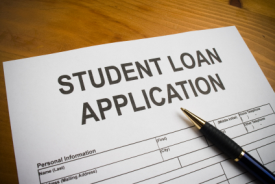Loans
If the financial aid you receive from grants, scholarships, and federal programs doesn’t cover you total cost of attendance, loans might be an option to consider.
 What is a loan?
What is a loan?
A loan is borrowed money that must be paid back with interest. To receive an education loan, you must be at least a part-time student or taking six to eight credits. However, you don’t have to being repaying your loan until six months after you finish your degree or program. You have up to 10 years to repay your loans.
There are many lenders and many loan options, so be sure to research your options before you apply. Be careful to look at and understand the interest rates and the terms of agreement. Apply in time to receive the funds before your school year starts.
What kinds of loans can I get?
- Perkins loans are low-interest loans offered to students with the most financial need. The federal government pays the interest on Perkins loans if you’re enrolled in school at least half-time.
- Subsidized Stafford loans are low-interest loans offered to students with significant financial need. The federal government pays the interest on subsidized Stafford loans if you’re enrolled in school at least half-time.
- Unsubsidized Stafford loans are low-interest loans available to all eligible students, regardless of financial need or family income. You’re responsible for paying the interest on unsubsidized Stafford loans as soon as the money is received.
PLUS loans are low-interest loans available to parents of dependent students and to graduate and professional students. PLUS loans may be helpful if you still have uncovered expenses after adding up all your financial aid and borrowing the maximum amount in Stafford loans.
What you should know about loans…
Student loans can be important in making college education affordable, especially when grants and scholarships don’t cover all costs. But remember, all loans must be paid back. Usually you don’t have to start paying on your loans until you’ve either graduated or left college for an extended period of time, but make sure you understand everything there is know before signing on the dotted line.
Grace period
All students have a six to nine-month grace period between the time you leave college and the time you start paying back your loans. Even if you do not graduate from college, you still have to repay your loans. The repayment period for parent loans begin shortly after the loan is disbursed.
Loan deferment
If you have an emergency that prevents you from repaying your loan, you can request a temporary loan deferment so that you don’t have to pay your loans during this time. You must apply and be approved before you can qualify for a loan deferment.